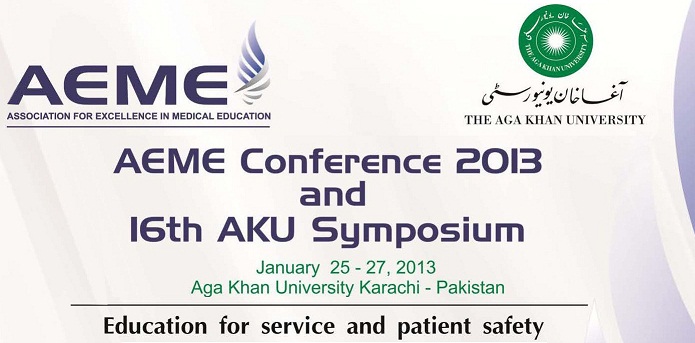Day 1 : Oral Presentations (Theme: Evaluation & Quality Assurance)
Surgical residency in Pakistan - End user perspective and need for change
Location
Lecture Hall 1
Start Date
26-1-2013 11:25 AM
Abstract
Background: History of structured training in surgery in Pakistan dates back to early 1960’s with the foundation of College of Physician and Surgeons’ of Pakistan (CPSP). Since then there is continuing effort by the college and associated institutes to facilitate growth of trainees as competent surgeon and surgeon-researcher.
Objective: To assess the progress of surgical training program in Pakistan and perspective of trainees about their training as competent surgeon and researcher.
Method and material: It was a web link (SurveyMonkey TM) based multi-institutional survey, questionnaire circulated through personalized and group based emails. We included trainees and graduates from CPSP enrolled in surgery and allied sciences. Incompletely filled questionnaires or those filled by MS (Masters in Surgery) candidates were excluded. Analysis performed using SPSS version 19.
Results: Total 130 responses received, of which 18 were excluded. 79% of respondents were male and more than 50% had enrollment with college in last 10 years. 50% had one or more academic activity during training but only 46% think that these activities are of any help and 54% of them are trainees from last 10 years (p=0.048). 48% think that learning research methodology and doing clinical research is important part of training, of which 58% are recent trainees (p=0.006). 48% responded that their institute provide support for research and this has emerged in recent years (p=0.004). Supervisors’ support in completion of CPSP dissertation and overall development as researcher has not changed over years (p=0.152). Writing synopsis, getting it approved and then dissertation writing is a problem area in general and majority of respondents were not satisfied with handling of their synopsis and dissertation at CPSP (p= 0.005, p= 0.04). 48% think that this training has helped/will help them becoming independent surgeon but only 29% think that this has helped/will help them getting a job and these findings are consistent over years.
Conclusion: There have been significant reforms in research based orientation of trainees and institutes but practical implication in terms of supervisors’ and CPSP support is still an area for improvement.
Surgical residency in Pakistan - End user perspective and need for change
Lecture Hall 1
Background: History of structured training in surgery in Pakistan dates back to early 1960’s with the foundation of College of Physician and Surgeons’ of Pakistan (CPSP). Since then there is continuing effort by the college and associated institutes to facilitate growth of trainees as competent surgeon and surgeon-researcher.
Objective: To assess the progress of surgical training program in Pakistan and perspective of trainees about their training as competent surgeon and researcher.
Method and material: It was a web link (SurveyMonkey TM) based multi-institutional survey, questionnaire circulated through personalized and group based emails. We included trainees and graduates from CPSP enrolled in surgery and allied sciences. Incompletely filled questionnaires or those filled by MS (Masters in Surgery) candidates were excluded. Analysis performed using SPSS version 19.
Results: Total 130 responses received, of which 18 were excluded. 79% of respondents were male and more than 50% had enrollment with college in last 10 years. 50% had one or more academic activity during training but only 46% think that these activities are of any help and 54% of them are trainees from last 10 years (p=0.048). 48% think that learning research methodology and doing clinical research is important part of training, of which 58% are recent trainees (p=0.006). 48% responded that their institute provide support for research and this has emerged in recent years (p=0.004). Supervisors’ support in completion of CPSP dissertation and overall development as researcher has not changed over years (p=0.152). Writing synopsis, getting it approved and then dissertation writing is a problem area in general and majority of respondents were not satisfied with handling of their synopsis and dissertation at CPSP (p= 0.005, p= 0.04). 48% think that this training has helped/will help them becoming independent surgeon but only 29% think that this has helped/will help them getting a job and these findings are consistent over years.
Conclusion: There have been significant reforms in research based orientation of trainees and institutes but practical implication in terms of supervisors’ and CPSP support is still an area for improvement.

